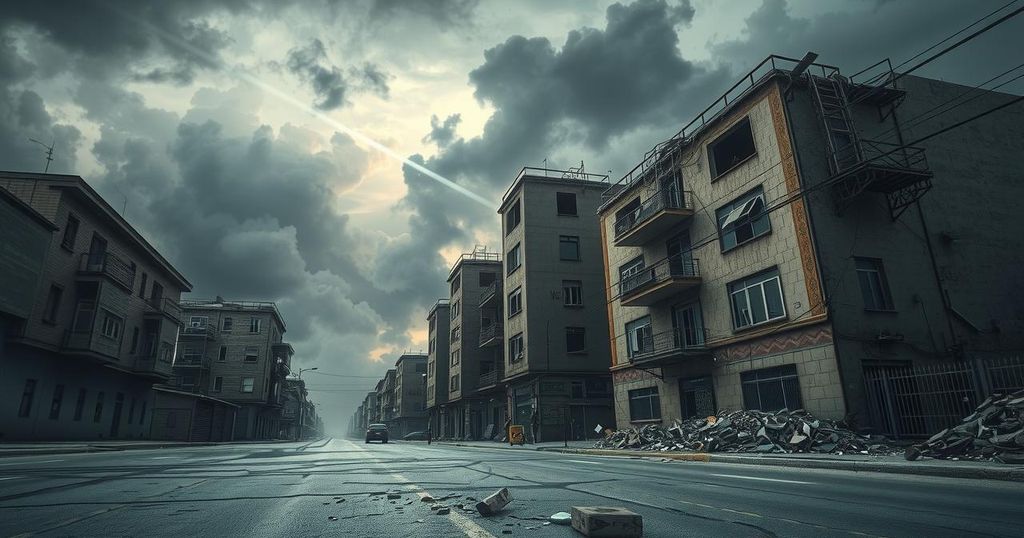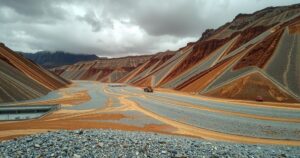Escalating Conflict in the DRC: M23 Insurgency and Global Implications

The Democratic Republic of Congo faces an escalating conflict as the M23 rebel group expands control, displacing hundreds of thousands and prompting international concern. The situation in Goma underscores significant humanitarian crises, with implications for global mineral supply chains. Historical ethnic tensions and foreign influences complicate the conflict, which threatens regional stability and calls for a reevaluation of international responses.
A deadly insurgency in the Democratic Republic of Congo (DRC) has intensified, with the rebel group M23 expanding control southward from Goma. This escalation marks the most severe conflict resumption in 13 years, risking a wider war in a historically volatile region. M23’s leader Corneille Nangaa has committed to advancing to the capital, Kinshasa, as the Congolese government mobilizes for defense, with President Félix Tshisekedi vowing territorial reclamation.
The DRC has faced conflict since gaining independence from Belgium in 1960. The current violence, escalating over the past three years with clashes between national forces and M23 insurgents, resulted in over 400,000 people being displaced last month alone. The violent confrontations in Goma have claimed several lives of United Nations peacekeepers, indicating the dramatic nature of the situation.
If M23 succeeds in capturing additional territory, especially in South Kivu, it could reclaim land lost after the two major wars (1996-2003) that killed between 3 million to 5.5 million civilians, primarily due to malnutrition and disease. Tshisekedi’s government has condemned this offensive as a declaration of war by Rwanda, revealing the severe humanitarian crisis as vital services have been disrupted, and corpses remain unaddressed in Goma.
Internationally, the brutality of the conflict drew attention when 300 Romanian mercenaries retreated to a UN peacekeeping base after failing to secure their position. Protests against the perceived inaction from global powers, including France, caused the burning of the French Embassy. The muted Western response could provide competitive advantages for nations like China and Russia in the DRC.
M23, primarily consisting of ethnic Tutsi fighters, emerged amid longstanding ethnic tensions linked to Rwanda’s historical context. Its formation was a response to the 1994 Rwandan genocide that exterminated a significant number of Tutsi individuals. Though some rebels integrated into the Congolese army, others splintered off to form M23, which has consistently received accusations of receiving backing from Rwanda.
China plays a pivotal role in the DRC’s mineral wealth, particularly cobalt, which is crucial for electric vehicle and smartphone batteries. With 80% of cobalt production owned by Chinese firms, any instability threatens global electronics supply chains. China has voiced concern over the M23’s activities, reflecting a growing worry about the potential for broader conflict.
Rwanda’s involvement is contentious; M23’s resurgence resembles past insurgency episodes. Despite facing international backlash, Rwanda continues to receive foreign support due to its perceived stability and strategic positioning in Africa. Yet, with the latest conflict dynamics, Western nations are reconsidering their alliances and financial support to Rwanda amidst the ongoing violence.
The Democratic Republic of Congo has a complex history marked by prolonged conflict, directly linked to its rich mineral resources. The resurgence of the M23 rebel group threatens the regional stability that had seen relative calm. Historical ethnic conflicts and international dynamics, including Rwanda’s alleged support for M23 and China’s significant investment in the DRC’s mining industry, add layers of complexity to the current crisis. As violence escalates, the humanitarian situation deteriorates, prompting global responses that reassess geopolitical stakes.
The situation in the DRC reflects a re-emerging crisis fueled by historical tensions and immediate threats from the M23 rebel group. With significant humanitarian consequences and the risk of broader regional conflicts, the international community must reconsider its interventions. The entwined roles of Rwanda and China in the DRC’s affairs illustrate the geopolitical implications of local conflicts, emphasizing the need for comprehensive and strategic responses to restore peace.
Original Source: www.nbcnews.com




